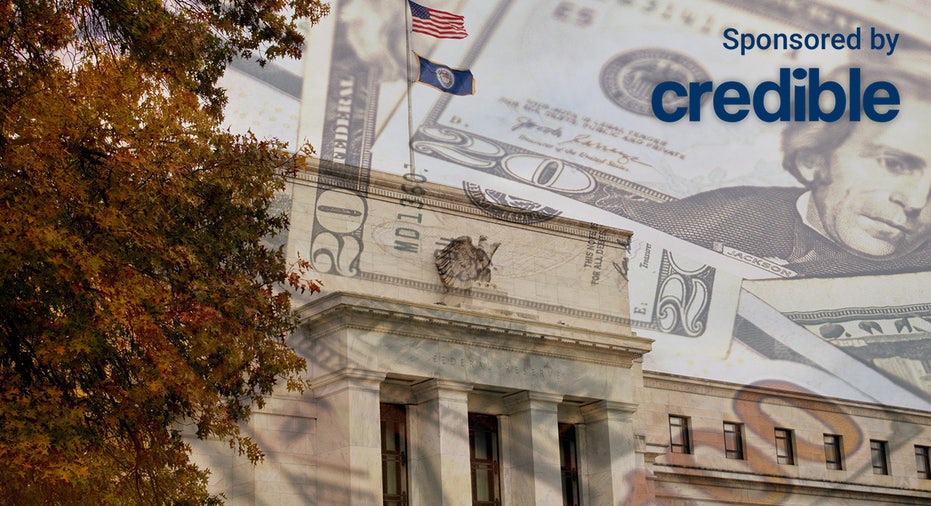Federal Reserve raises interest rates by highest increase since 1994
Here's what that means for your finances

The Federal Reserve raised interest rates by 75 basis points at its June meeting, the highest increase since 1994. (iStock)
In an attempt to combat rising inflation, the Federal Reserve announced Wednesday that it would raise interest rates by 75 basis points, the largest rate hike since 1994.
The increase, which came at the conclusion of the June Federal Open Market Committee (FOMC) meeting, marks the third interest rate hike of 2022 and pushes the federal funds target range to 1.5% to 1.75%.
"Today's 75-basis-point increase represents the latest attempt by the Federal Reserve to maintain credibility with financial markets and consumers," Morning Consult Chief Economist John Leer said on Wednesday. "The inflation outlook deteriorated over the past month with gas prices driving prices higher in May, and the Fed felt like these changes in the economy warranted an even steeper rate increase than Chairman Powell had signaled last month."
Prior to this rate hike, the Federal Reserve raised interest rates by 50 basis points in May and by 25 points in March. And more rate hikes from the central bank are likely on the horizon.
"The invasion of Ukraine by Russia is causing tremendous human and economic hardship," the FOMC said in its meeting statement. "The invasion and related events are creating additional upward pressure on inflation and are weighing on global economic activity. In addition, COVID-related lockdowns in China are likely to exacerbate supply chain disruptions. The Committee is highly attentive to inflation risks."
As the federal funds rate rises, other interest rates will also go up. One way you can take advantage of the current interest rates is by refinancing your private student loans to lower your monthly payment. You can visit Credible to speak to a student loan expert and see if this is the right option for you.
INFLATION REACHES NEW 40-YEAR HIGH IN MAY WITH NO SIGN OF SLOWING DOWN
Fed likely to continue raising rates
Fed officials are still likely to raise rates several more times this year and into 2023 as it combats decades-high inflation.
"The FOMC followed through with the largest rate hike since 1994, and the median committee member expects another 175 basis points of hikes before year end," Curt Long, National Association of Federally Insured Credit Unions' (NAFCU) chief economist and vice president of research, said. "That is a sharp departure from the committee’s forecast three months ago, and the rest of the economic projections bear that out.
"Real GDP was revised down heavily for 2022 and 2023, and the unemployment rate is projected to be higher, climbing above 4% by 2024," Long said. "It is clear the FOMC believes it has no choice but to flirt with a recession in order to address inflation."
Other economists agreed, saying the central bank will likely raise the federal funds rate to about 4% by the end of next year.
"The Federal Reserve is racing to catch up to economic events, announcing today a 75-basis-point increase and signaling more increases to come," Mike Fratantoni, Mortgage Bankers Association (MBA) senior vice president and chief economist, said on Wednesday. "A federal funds target rate likely to reach almost 4% by the end of 2023 should be effective in slowing the economy and ultimately bringing down inflation."
If you want to take advantage of interest rates now before they rise higher, you could consider refinancing your mortgage to reduce your monthly payments. Visit Credible to compare multiple mortgage lenders at once and choose the one with the best interest rate for you.
MILLENNIAL, GEN Z CONSUMERS TURNING TO BNPL SERVICES AS COSTS RISE: SURVEY
How the Fed's rate hike affects your wallet
As markets awaited the Fed’s decision this week, interest rates have already begun to surge in many sectors, including mortgage rates. The average 30-year mortgage rate surged past 6% this week in anticipation of the FOMC decision, according to Keller Williams' chief economist, Ruben Gonzalez.
And interest rates for other financial products, such as student loans, personal loans and credit cards, will also rise. With inflation having risen to a new 40-year high in May, the Fed will likely continue to raise interest rates and slow economic growth.
If you want to take advantage of interest rates now, you could consider taking out a low-interest personal loan to help you pay down debt. To see if this is the right option for you, you can contact Credible to speak to a loan expert and get all of your questions answered.
Have a finance-related question, but don't know who to ask? Email The Credible Money Expert at moneyexpert@credible.com and your question might be answered by Credible in our Money Expert column.




















